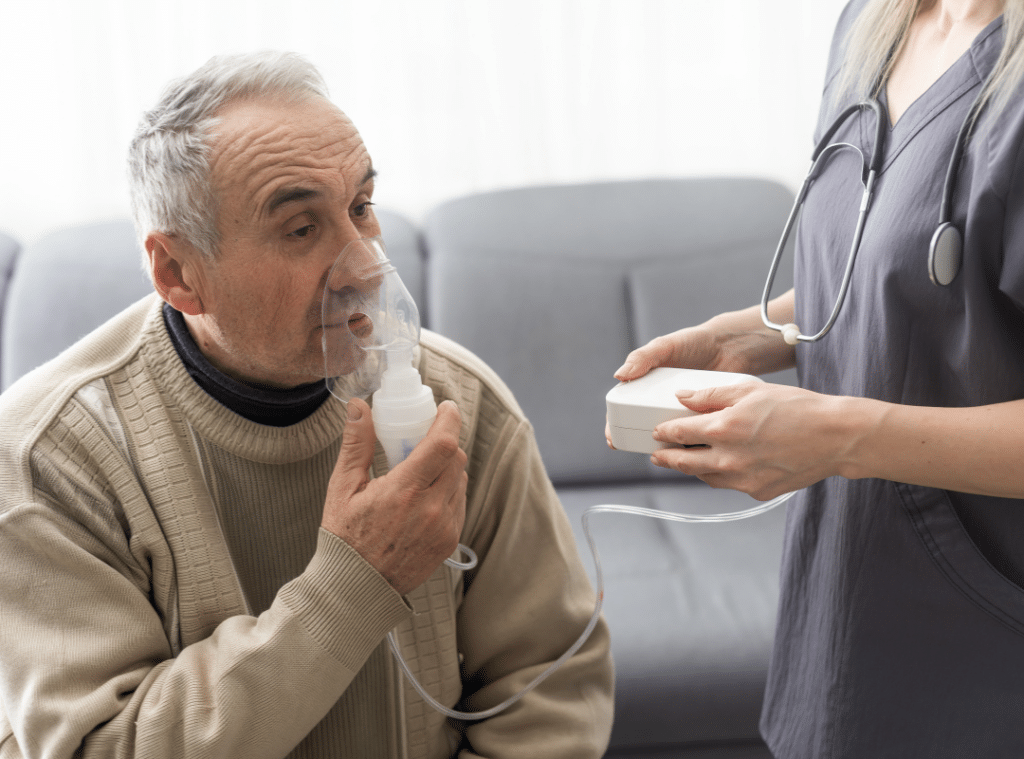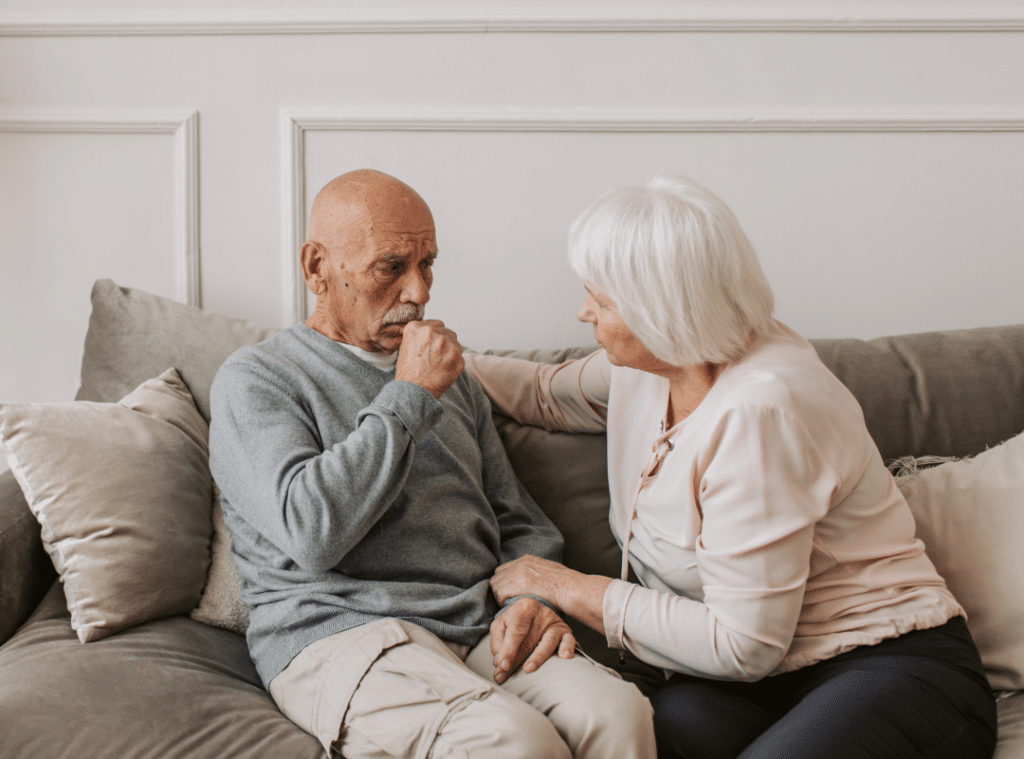Coughing may seem like a minor issue, but in older adults, it can signal deeper health concerns. Whether it’s a persistent dry cough or an infection-related wet cough, understanding how to manage and treat cough in old age can make a significant difference in seniors’ quality of life.
In this guide, we’ll explore the causes, prevention strategies, and treatment options for senior coughs—especially when they become chronic or impact sleep. With tailored care and timely interventions, you can support loved ones experiencing coughing episodes, recognize when professional help is necessary, and reduce health risks associated with untreated symptoms.
To learn how our community helps support respiratory health and overall well-being, visit The Oaks at Paso Robles.
The Importance of Assessing Cough in Seniors
Monitoring and assessing a cough in old age is vital, as even a minor symptom can indicate serious health issues. Many older adults may not report coughing unless it becomes disruptive, so caregivers must remain observant. Persistent or severe coughs can stem from infections, chronic illnesses like COPD, or complications due to weakened immunity.
If you’ve ever asked, “When should I worry about a cough in the elderly?” the answer is simple—when it lasts more than three weeks, disrupts sleep, or includes symptoms like blood or wheezing, seek medical advice immediately.
Learn more about the causes of cough and why early assessments matter.
What Causes Cough in the Elderly?
Understanding why the elderly cough so much begins with identifying common triggers. Age-related changes in immunity and respiratory function make seniors more prone to coughing.
Common Causes Include:
- Respiratory infections like pneumonia or bronchitis
- Postnasal drip or sinus issues
- Gastroesophageal reflux disease (GERD)
- Chronic Obstructive Pulmonary Disease (COPD)
- Allergies and asthma
- Medication side effects, such as ACE inhibitors
Persistent coughing could also reflect underlying health conditions, so don’t overlook the need for professional evaluation. Learn how to recognize cold symptoms in seniors.
Dry vs. Wet Cough in Seniors: Know the Difference
Distinguishing between dry and wet coughs helps determine the best course of action. Each type has different implications, particularly in older adults with compromised immunity.
Dry Cough in an Elderly Woman
A dry cough in an elderly woman can be especially worrisome if it’s persistent. It often results from irritants, allergies, or underlying respiratory issues such as asthma or bronchitis.
Signs to watch for:
- Scratchy or tickly throat
- No mucus production
- Nighttime worsening
- A cough that lasts more than three weeks
Learn more about elderly cough treatment options here.
Wet Cough
A wet cough produces mucus and can indicate a respiratory infection. It may accompany chest discomfort or wheezing.
Watch for:
- Yellow or green mucus
- Difficulty breathing
- Fever or fatigue
- Disruption in daily activities
If mucus appears dark, foul-smelling, or blood-tinged, seek medical attention immediately.
Explore more about bronchitis symptoms in the elderly.

Best Treatments for Cough in Older Adults
Treating cough in old age requires a balance between home remedies and clinical care. The first step is identifying the type of cough, then tailoring the treatment accordingly.
Home Remedies That Help
Whether managing a dry or wet cough, these home remedies can offer comfort:
- Warm teas with honey
- Humidifiers to moisten dry airways
- Saline sprays for postnasal drip
- Elevated sleeping positions to reduce nighttime coughing
- Staying hydrated
Medical Options
Medical intervention may include:
- Antihistamines for allergy-induced dry cough
- Expectorants for clearing mucus in a wet cough
- Cough suppressants (under doctor supervision)
- Bronchodilators or steroids for asthma or COPD
- Antibiotics for bacterial infections
Patient education is crucial—help seniors understand their symptoms and when to escalate care.
For an overview of how to treat cough effectively, check out this helpful guide.
For additional tips, see this external resource on managing chronic cough in the elderly.
How to Manage Nighttime Cough
Nighttime coughing affects sleep quality and increases fatigue in seniors. Fortunately, several strategies can help manage it:
- Use two pillows to elevate the head
- Run a humidifier at night
- Avoid allergens like dust or pet dander
- Encourage a pre-bedtime warm drink like chamomile tea
- Administer prescribed cough medicine on schedule
A persistent nighttime cough may signal deeper issues like GERD or heart failure—conditions that demand medical evaluation.
When Should I Worry About a Cough in the Elderly?
You’re not alone if you’ve asked, “When should I worry about a cough in the elderly?” Red flags include:
- Lasts longer than 3 weeks
- Produces blood-tinged mucus
- Causes shortness of breath or wheezing
- Is accompanied by weight loss or fatigue
- Occurs alongside chest pain or high fever
If any of these symptoms appear, seek a physician’s guidance immediately. Coughing could be masking serious conditions like pneumonia, lung cancer, or heart issues.
Preventing Coughs in Seniors
Prevention is the best defense when dealing with a cough in old age. Proactive habits can reduce the frequency and severity of coughing episodes.
Key Prevention Tips:
- Quit smoking and avoid secondhand smoke
- Use air purifiers to minimize dust and allergens
- Stay current on flu and pneumonia vaccines
- Encourage regular handwashing to prevent infections
- Keep seniors physically active to strengthen lung function
- Schedule routine check-ups for early detection
A well-maintained environment, combined with healthy habits, goes a long way in protecting older adults from respiratory illnesses.
Here’s a helpful external guide on improving respiratory health in seniors.
Take Control of Senior Cough Symptoms Today
Understanding the causes, differences, and treatment strategies for cough in old age helps ensure your loved one’s health and comfort. Whether it’s a dry cough in an elderly woman, an infection-related wet cough, or you’re unsure why the elderly cough so much, the key is to stay proactive.
Don’t wait until the symptoms worsen. Schedule a tour today and discover how our personalized care at The Oaks at Paso Robles can support your loved one’s respiratory health and overall well-being. For direct assistance, call us at (805) 239-5851.
Let’s work together to promote wellness and peace of mind—because every breath matters.
Frequently Asked Questions
How do you stop an elderly cough?
To help stop an elderly cough, start by identifying the underlying cause, such as allergies, infections, or dry air. Keeping the air moist with a humidifier and encouraging hydration can soothe the throat. Warm liquids like herbal teas or broths may also provide relief. If the cough persists, consult a healthcare provider to rule out more serious conditions.
When is a cough serious in the elderly?
A cough is considered serious in the elderly when it lasts more than a few weeks, produces blood, or is accompanied by chest pain, fever, or shortness of breath. Seniors are more vulnerable to complications from infections like pneumonia or bronchitis. Sudden or worsening symptoms should not be ignored. In such cases, prompt medical evaluation is essential to prevent further health issues.
What is the cause of a continuous cough?
Several factors, including respiratory infections, asthma, allergies, or chronic conditions like COPD, can cause a continuous cough. In some cases, acid reflux or certain medications can also trigger ongoing coughing. For seniors, weakened immunity or age-related lung changes may increase the likelihood. Identifying the root cause with a doctor is key to effective treatment.
When to worry about a cough?
You should worry about a cough if it persists for more than three weeks, worsens over time, or is paired with symptoms like wheezing, chest pain, or weight loss. For elderly individuals, even a mild cough can become serious if it interferes with breathing or causes fatigue. Bloody mucus or high fever are also warning signs. Seeking medical care early can help prevent complications.








